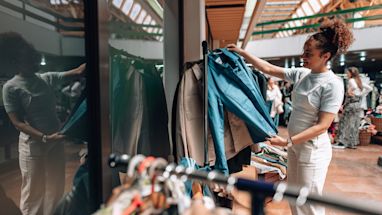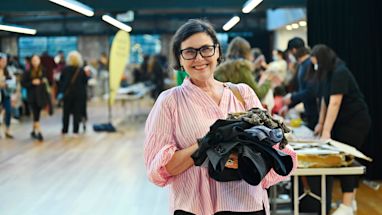In June, NSW Government legislation banned lightweight plastic bags. More single-use plastics are banned from Tuesday 1 November. Businesses will no longer be able to supply these items and customers will no longer be able to receive them, including when buying takeaway food.
It’s all part of the NSW Government’s plan to phase out single-use plastics and reduce the harmful impact these items have on our environment.
Instead of seeking out single-use plastic alternatives, like paper or bamboo, let’s say goodbye to single-use items altogether. Read on for more ways to do this.
Lightweight plastic bags

Many of us are already in the habit of carrying a reusable bag but lightweight plastic bags were officially banned across the state from Wednesday 1 June.
Lightweight bags made from biodegradable plastics, compostable plastics or bio-plastics are banned, including those made from Australian certified compostable plastic.
The ban doesn’t apply to barrier bags such as bin liners, nappy bags or dog poop bags, produce and deli bags, or bags used to contain medical waste.
Use these instead
- Carry a reusable shopping bag whenever you go out. Make it a habit to always keep one in your bag or pocket.
- If you forget to bring your own bag and need a disposable alternative, ask for one made from paper. Or better yet, ask shop employees if they have a leftover delivery box you could reuse.
- Using paper bags instead of lightweight plastic bags isn’t a great option if the paper bags only get used once. Try to reuse paper bags over and over again before placing them in the recycling bin.
Single-use plastic straws, stirrers and cutlery

From Tuesday 1 November, single-use plastic straws, stirrers, swizzle sticks, and cutlery, including forks, spoons, knives, sporks, splayds, chopsticks, and food picks are banned. This includes items made from biodegradable plastics, compostable plastics or bio-plastics. Some exemptions apply.
Use these instead
- When buying takeaway food, say no to single-use cutlery. Instead carry reusables in your bag or take food back home or to the office to eat.
- Try to avoid single-use items altogether, including paper straws. Go straw-less and ask for your drink without the straw.
- If you have time, choose to dine in-store where you can be served with reusable cutlery.
Single-use plastic bowls and plates

From Tuesday 1 November, single-use bowls and plates are also banned, including items made from biodegradable plastics, compostable plastics or bio-plastics.
The ban doesn’t apply to single-use plastic bowls designed to have a spill-proof lid, such as those used for takeaway soup, or single-use paper plates and bowls with a plastic lining. Find out more about the exemption.
Use these instead
- Bring your own clean plates, bowls or containers for takeaway food. Many businesses are happy to accept these.
- If you have time, choose to dine in-store where you can be served with reusable bowls or plates.
- If you’re planning an event or party, consider reusables before purchasing disposable paper plates for guests. Paper plates are often too contaminated to be recycled and require special composting. Bamboo plates also can’t go in recycling bins.
Expanded polystyrene food service items

From Tuesday 1 November, all expanded polystyrene food service items are banned in NSW, such as clamshells, cups, plates and bowls.
Use these instead
- Again, reusables are the way to go. Bring your own clean plates, bowls or containers for takeaway food.
- Choose to dine in-store where you can be served with proper plates, bowls and cutlery.
Single-use plastic cotton buds and microbeads in certain personal care products

From Tuesday 1 November, you’ll no longer be able to buy single-use plastic cotton buds and rinse-off personal care products containing plastic microbeads, such as face and body cleansers, exfoliants and masks, shampoo, conditioner, hair dyes and toothpaste.
Use these instead
The reusable beauty market is growing. Look for reusable silicon ear buds that you can clean and use again.
Why are compostable plastic alternatives banned?
Most items made from compostable plastic and bioplastics look just like regular plastic but they can’t be recycled at the same facilities. They don’t biodegrade unless they’re treated in a commercial composting facility.
If compostable plastics or bioplastics end up in landfill or as litter in the environment, they won’t break down and create just as big a problem as conventional plastic.
Supplying compostable plastic and bioplastic straws, cutlery, stirrers, bowls and plates is not allowed under the NSW ban, even if they’re labelled plastic-free.
More information and resources
- Visit Single Use Plastics Ban.
- If you run a business, find out what the NSW Government’s single-use plastics bans mean for you, how to prepare and where to go for more resources and support.
Published 11 April 2022, updated 1 November 2022



